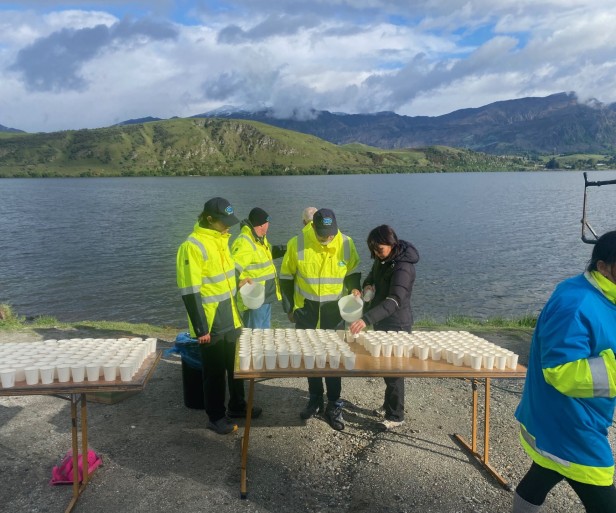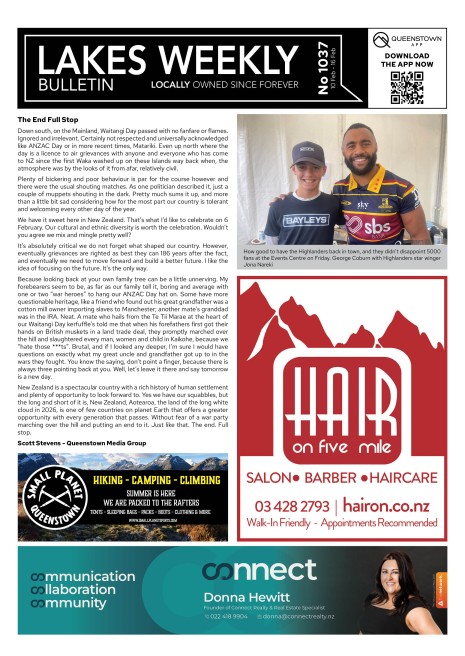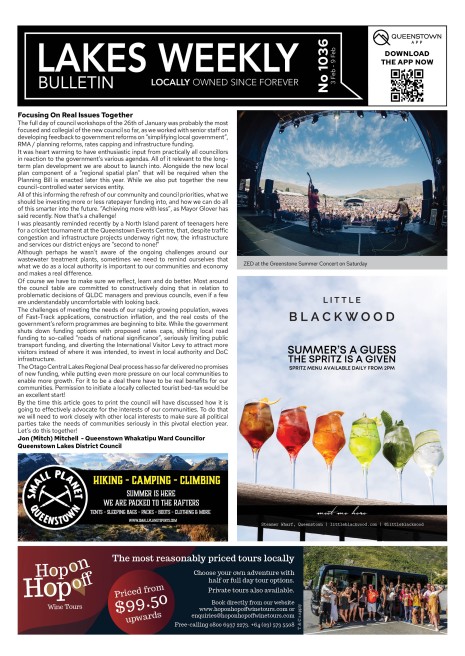Visitor levy, affordable housing top priorities in regional deal

Bespoke settings to ensure growth pays for growth are the top priority for a Southern Lakes and Central Otago delegation heading to the negotiating table with Wellington decision makers.
At the inaugural meeting of the Otago Central Lakes Regional Deal Negotiation Committee on Friday (July 18), representatives from Central Otago, Queenstown Lakes and Otago Regional Councils ranked five initiatives they’re keen to progress with central government.
At number one, “capturing value” - with a local visitor levy and mining royalties listed alongside bespoke settings to “ensure growth pays for growth” and to “enable a pipeline of affordable housing”.
Other initiatives set to be taken to the negotiating table, in order of priority, include: “transforming transport”, "electrify Otago Central Lakes”, “private investment-public health”, and “visitors and investors”.
Prior to the discussion, Queenstown Lakes District Council (QLDC) strategy and reform manager Pennie Pearce said early conversations with Department of Internal Affairs staff had made it clear the team needed a clear sense of priorities.
There was little point, she said, in claiming “they’re all important” - even if that reflected local sentiment.
QLDC mayor Glyn Lewers noted the priorities were “widely integrated” - for example, new affordable housing would be difficult without strong transport links.
The committee also agreed to appoint an advisor to support negotiations and potentially take the role of independent negotiator.
Proceedings began with the election of Otago Regional Council (ORC) chair Gretchen Robertson as committee chair, with Central Otago District (CODC) councillor Tracy Paterson as her deputy until October’s local government elections, which could change the committee’s makeup.
After her appointment, Gretchen described the regional deal as both a “genuinely exciting opportunity” and “a big responsibility” for the committee.
“We’ll be dealing with significant issues, and there is enormous potential here.”
She stressed the importance of unity among ORC, QLDC and CODC throughout the process: “It’s not a competition, it’s a commitment.”
Regional deals are a new initiative from the Beehive, designed to foster long-term partnerships between central and local government, focused on tackling regional development challenges and unlocking economic growth and potential.
In early July, Otago Central Lakes was one of the first regions to sign a Memorandum of Understanding to begin negotiating a deal, alongside Auckland and Western Bay of Plenty.
Each deal will be based on a 30-year vision for the respective region and be implemented through a 10-year strategic plan.
The government has signalled its intent to finalise the first of the three deals by the end of the year.
So, what will this region be asking for?
While an update on the negotiations already underway with Wellington was reserved for discussion in the public-excluded section at the end of Friday’s committee meeting, here are the broad priorities that were made public:
Capturing Value
Bespoke settings to ensure growth pays for growth
Local visitor levy
Bespoke settings to enable a pipeline of affordable housing
Mining royalties
Transform Transport
Refresh transport strategy around offline
MRT and sub-regional visitor, commuter and freight links
Establish bespoke settings to enable offline MRT
Establish alternative funding/financing/ownership/delivery mechanisms for critical public transport, roading and bridge infrastructure
Electrify Otago Central Lakes
Provide streamlined planning and land acquisition pathway for a transmission corridor
Establish bespoke settings to allow Queenstown to be treated as part of the grid
Require Transpower to undertake additional options analysis for the new Queenstown line
Launch the Ratepayer Assisted Scheme for rooftop solar and batteries
Establish bespoke settings to enable innovation in alternative energy generation
Establish bespoke settings to enable increased uptake of solar
Private Investment, Public Health
Use OCL resident and visitor numbers in funding model
Accelerate the delivery of a comprehensive health needs assessment for the region
Develop integrated private/public healthcare models
Deliver partnered health services based on high priority needs and private opportunities
Visitors and Investors
Grow highly productive sectors
Increase total value of the visitor economy
Position OCL as New Zealand’s investment and business shopfront
Power sustainable tourism through data driven insights







